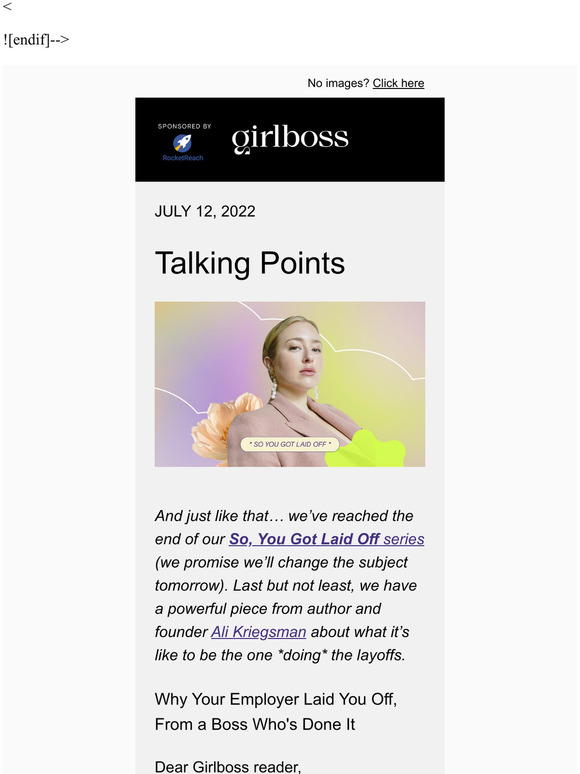The Company That Laid You Off Wants You Back: What To Say

Table of Contents
Assessing the Offer: Is it Right for You?
Before you even consider what to say to your former employer, take time to carefully assess the offer itself. Is returning to your previous role the best move for your career trajectory?
Reasons for Reconsideration:
Understanding why the company is rehiring you is paramount. Were there unforeseen circumstances?
- Increased workload: Perhaps a key employee left, and your skills are uniquely suited to fill the gap.
- Project needs: A new, lucrative project might require your specific expertise.
- New opportunities: Your former role might have been restructured, presenting a new and improved version.
Consider if the reasons for your initial layoff have been addressed. Was it a company-wide restructuring due to economic downturn, or was it performance-related? If it was performance-based, have you demonstrably improved your skills or addressed the concerns raised? Understanding the context is crucial to determining whether this is a genuine opportunity or a temporary fix.
Evaluate the Current Situation:
Beyond the immediate offer, examine the broader context of the company.
- Financial health and stability: Research the company's recent financial performance. Are they still struggling, or have they successfully navigated the challenges that led to the layoffs?
- Team dynamics and management changes: Has the team structure changed significantly? Are there new managers or team members? How has the company culture evolved?
- Policy and benefit changes: Have there been any alterations to salary structures, benefits packages (health insurance, retirement plans, paid time off), or company policies since your departure?
Bullet Points:
- Research the company's recent news and performance using reputable financial news sources.
- Check online reviews from current employees on sites like Glassdoor or Indeed to gauge the current workplace environment.
- Reach out to former colleagues (discreetly) for their insights into the current situation and company culture.
The Crucial Conversation: What to Say During the Initial Contact
The initial contact is crucial in setting the tone for future negotiations.
Expressing Interest and Gratitude:
Your initial response should be professional and positive.
- Express gratitude: Begin by thanking them for reaching out and offering you the opportunity to return. Acknowledge the offer respectfully.
- Maintain a positive tone: Avoid any negativity or resentment about the initial layoff.
- Keep it brief: Express your interest in exploring the opportunity further, but avoid committing to anything immediately. A simple "Thank you for considering me. I'd be happy to discuss this further at your convenience" is sufficient.
Asking Clarifying Questions:
Use this opportunity to gather more information.
- Reasons for rehiring: Ask specifically why they are rehiring you now. This will help you understand the context and assess the long-term stability of the position.
- Role responsibilities and changes: Inquire about any changes to the role's responsibilities, expectations, and reporting structure since your departure.
- Company's future plans and stability: Ask about the company's current projects, growth plans, and overall financial health.
Bullet Points:
- Prepare a list of thoughtful questions beforehand to guide the conversation.
- Avoid negativity or expressing resentment about the past.
- Focus on the future and the potential for mutual benefit. Frame your questions around how you can contribute to the company's success.
Negotiating Your Return: Salary, Benefits, and Expectations
Returning to your previous role doesn't mean accepting the same terms.
Assessing Your Worth:
Before negotiations begin, assess your current market value.
- Salary research: Research current salary ranges for similar roles in your area using sites like Salary.com or Glassdoor.
- Experience gained: Consider any new skills or experience you gained during your time away from the company. Quantify these achievements whenever possible.
- Additional certifications: Highlight any certifications or training you've completed, further enhancing your value.
Communicating Your Expectations:
Clearly articulate your needs and expectations.
- Salary expectations: State your salary expectations clearly, justifying them with your experience, market research, and the value you bring.
- Benefits negotiation: Negotiate benefits such as vacation time, health insurance, retirement contributions, and any other perks that are important to you.
- Career goals: Discuss your career aspirations and expectations for growth within the company. Show them you're invested in their long-term success as well as your own.
Bullet Points:
- Be prepared to compromise, but don't undervalue yourself. Know your minimum acceptable salary and benefits.
- Know your bottom line and stick to it. Don't be afraid to walk away if the offer doesn't meet your needs.
- Emphasize the value you bring to the company and how your skills and experience can contribute to their success.
Making the Right Decision: Weighing the Pros and Cons
Once you've gathered all the information and negotiated your terms, carefully weigh the decision.
Consider Long-Term Career Goals:
Does returning to your previous employer align with your long-term career aspirations?
- Career growth: Are there opportunities for advancement and professional development within the company?
- Professional goals: Will this role help you achieve your short-term and long-term professional goals?
- Skill development: Will the role allow you to further develop your existing skills and acquire new ones?
Personal Well-being:
Returning to a toxic work environment could negate any financial benefit.
- Past experience: Reflect on your past experience at the company. Were you happy and fulfilled? Did you have a good relationship with your manager and team?
- Work-life balance: Consider the potential impact on your work-life balance.
- Overall well-being: Make sure the decision aligns with your overall well-being, both professionally and personally.
Bullet Points:
- Create a pros and cons list to objectively visualize the situation.
- Seek advice from trusted mentors, career counselors, or family members for additional perspectives.
- Don't rush into a decision. Take your time to carefully evaluate all aspects.
Conclusion
Being offered your job back after a layoff is a significant decision that requires careful consideration. By assessing the offer, communicating effectively, negotiating your terms, and weighing the pros and cons, you can make an informed choice that’s best for your career. Remember to approach the situation strategically and confidently, understanding your worth and clarifying your expectations. Use this guide to navigate the complexities of a "company wants you back after layoff" situation and make a decision that sets you up for success. Remember to always prioritize your career goals and well-being when making this important decision. Don't be afraid to negotiate for what you deserve!

Featured Posts
-
 Unlocking Podcast Potential Ais Role In Transforming Repetitive Documents
Apr 25, 2025
Unlocking Podcast Potential Ais Role In Transforming Repetitive Documents
Apr 25, 2025 -
 Open Ai Simplifies Voice Assistant Development At 2024 Event
Apr 25, 2025
Open Ai Simplifies Voice Assistant Development At 2024 Event
Apr 25, 2025 -
 Ultimate Guide To Makeup Organisers Organise Your Makeup Like A Pro
Apr 25, 2025
Ultimate Guide To Makeup Organisers Organise Your Makeup Like A Pro
Apr 25, 2025 -
 The Importance Of Peace On The Dnieper For Ukraine And Its Neighbors
Apr 25, 2025
The Importance Of Peace On The Dnieper For Ukraine And Its Neighbors
Apr 25, 2025 -
 You Tube Dominance Exploring Its Reach And Impact
Apr 25, 2025
You Tube Dominance Exploring Its Reach And Impact
Apr 25, 2025
Latest Posts
-
 Analyzing The Rhetoric Surrounding Gavin Newsoms Policies
Apr 26, 2025
Analyzing The Rhetoric Surrounding Gavin Newsoms Policies
Apr 26, 2025 -
 Hollywood Nepotism A Thunderbolt Stars Honest Confession
Apr 26, 2025
Hollywood Nepotism A Thunderbolt Stars Honest Confession
Apr 26, 2025 -
 Outrage As Newsom Interviews Steve Bannon Former Republican Representative Speaks Out
Apr 26, 2025
Outrage As Newsom Interviews Steve Bannon Former Republican Representative Speaks Out
Apr 26, 2025 -
 Gavin Newsoms Stance On Trans Athletes A Deeply Unfair Policy
Apr 26, 2025
Gavin Newsoms Stance On Trans Athletes A Deeply Unfair Policy
Apr 26, 2025 -
 The Political Landscape Assessing Governor Newsoms Actions
Apr 26, 2025
The Political Landscape Assessing Governor Newsoms Actions
Apr 26, 2025
